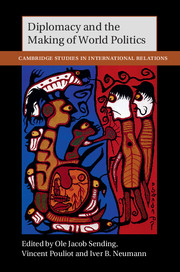Book contents
- Frontmatter
- Contents
- Contributors
- Acknowledgments
- Introduction
- Part I Making of international institutions
- Part II Making international cooperation
- 4 From representation to governing: diplomacy and the constitution of international public power
- 5 Institutionalizing peace and reconciliation diplomacy: third-party reconciliation as systems maintenance
- 6 Christian ethics, actors, and diplomacy: mediating universalist pretentions
- Part III Diplomacy as a contested terrain
- Conclusion: Relationalism or why diplomats find international relations theory strange
- Bibliography
- Index
- Cambridge Studies in International Relations
4 - From representation to governing: diplomacy and the constitution of international public power
from Part II - Making international cooperation
Published online by Cambridge University Press: 05 September 2015
- Frontmatter
- Contents
- Contributors
- Acknowledgments
- Introduction
- Part I Making of international institutions
- Part II Making international cooperation
- 4 From representation to governing: diplomacy and the constitution of international public power
- 5 Institutionalizing peace and reconciliation diplomacy: third-party reconciliation as systems maintenance
- 6 Christian ethics, actors, and diplomacy: mediating universalist pretentions
- Part III Diplomacy as a contested terrain
- Conclusion: Relationalism or why diplomats find international relations theory strange
- Bibliography
- Index
- Cambridge Studies in International Relations
Summary
A goal of this volume is to gain analytic traction on what seem to be great changes in the character and effects of diplomacy by bringing international relations (IR) and social theory to bear on the question. Toward this end, the Introduction proposes that while diplomacy has long been understood as a practice of representation, it is now “about much more” in that it also is about governance (Introduction, 111). Several scholars have offered interpretations of diplomacy as representation – for example, James Der Derian,1 Iver Neumann,2 Paul Sharp,3 Saffron Sofer,4 and Rebecca Adler Nissen.5 But that work does not consider how representation relates to governance. Representing and governing are distinct, and the distinction matters, because the practice of diplomatic representation is constitutive of the international society of states and its members,6 while the practice of global governing is potentially transformative of it. To assess the provocative proposition that the international system is moving beyond diplomatic representation, therefore, we need to have in mind what a practice of governing might entail, and along which dimensions it differs from versus overlaps with representation. That is the goal of this chapter.
112The chapter has three parts. I first summarize how IR scholarship has treated diplomacy as a practice of representation and suggest a variation that is broadly consistent, that diplomacy functions as a system of social virtue. Second, building on previous work,7 I propose that governing is a form of what philosophers of action call collective intentionality – more specifically it is a case of “joint action” or “concerting.”8 Governing is associated with acting together and its goal is to steer a social order, self-consciously, toward the pursuit of some shared ends. Governing takes on a particular importance when it is done by states. In domestic political theory, the state's public power is valued when it is understood as the capacity and responsibility to pursue its population's common good. I propose that if states can sustain joint action on common problems, they can act as an international public power. In the third, concluding section, I bring the two together and defend the continuing relevance of diplomacy's representational practices.
- Type
- Chapter
- Information
- Diplomacy and the Making of World Politics , pp. 111 - 139Publisher: Cambridge University PressPrint publication year: 2015
- 13
- Cited by

